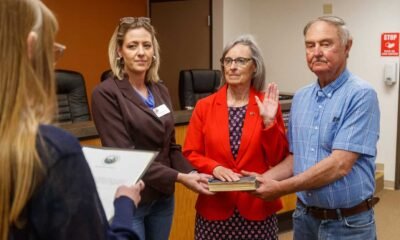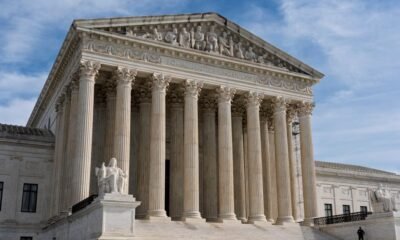attorney general
Arizona Teams Up with 18 States to Challenge Trump’s Election Mandates

Arizona has joined a coalition of states in a legal battle against President Trump’s recent executive order aimed at implementing stricter federal election regulations. Officials argue the order violates constitutional rights and intrudes upon states’ authority to manage elections.
Attorney General Kris Mayes described the executive order as “unacceptable and unconstitutional,” claiming it undermines nearly 250 years of legal precedent. Along with representatives from 18 other states, Mayes is urging a federal judge in Massachusetts to rule key provisions of the order illegal and unenforceable.
While certain parts of the executive order do not apply directly to Arizona—where proof of citizenship is already mandated for state and local elections—Mayes warns that it could extend these requirements to voters participating solely in federal elections, which contradicts federal law.
The lawsuit emphasizes that Trump’s proposed list of acceptable documents for voter registration dismisses even those recognized as valid by Arizona’s Republican-led legislature. For instance, using a legible copy of a birth certificate as proof of identity would no longer be allowed, though passports would still be accepted in another form.
The ramifications of this order may impact a significant number of voters in Arizona. Specifically, it could affect nearly 49,000 individuals registered under a federal form that currently allows them to vote without providing additional proof of citizenship—a right upheld by federal courts in previous cases.
“It’s onerous, especially regarding our tribes,” Mayes stated, emphasizing that even a small number of affected voters can influence federal elections, illustrated by Biden’s narrow victory in Arizona in 2020.
Concerns extend beyond voter registration. Secretary of State Adrian Fontes criticized the order for potentially requiring state election officials to share personal voter information with the federal government. He expressed alarm about the implications for voter privacy.
The executive order asserts that all ballots must arrive by Election Day, a stipulation already mirrored in Arizona law. However, Mayes highlighted that this could interfere with existing state provisions allowing voters to address issues with their ballots post-election.
In addition, the executive order threatens sanctions against states that do not comply, potentially hindering federal funding and exposing local election officials to prosecution.
Mayes has previously challenged the Trump administration in court multiple times and views this lawsuit as further evidence of presidential overreach. “We do not have kings, we do not have dictators. We have a Constitution and the rule of law,” she affirmed.
The crux of the lawsuit lies in claims that Trump’s executive order disregards existing federal law. Specifically, Congress has historically allowed states to run their own elections, authorizing certain regulations through laws like the National Voter Registration Act.
The act stipulates that states must accept self-affirmation of citizenship from voters using the federal registration form, not requiring documentary proof. Arizona’s laws necessitate such proof for state and local elections but still permit federal voters to participate under the federal guidelines.
Supporters of the lawsuit assert that imposing new documentation requirements would disrupt the independence of the Elections Assistance Commission and undermine its bipartisan framework. They argue that historical precedents and court decisions affirm the commission’s authority to operate without such restrictions.
In addition to Arizona’s legal actions, organizations such as the Campaign Legal Center and various civil rights groups have initiated separate lawsuits against the president’s order, aiming to safeguard voters’ rights. This collective response underscores the widespread concern about the future of voting access nationwide.
Given the stakes, officials like Josh Bendor from the Attorney General’s Office emphasize the importance of Arizona’s specific legal challenge to ensure protections relevant to the state’s voting population.


















